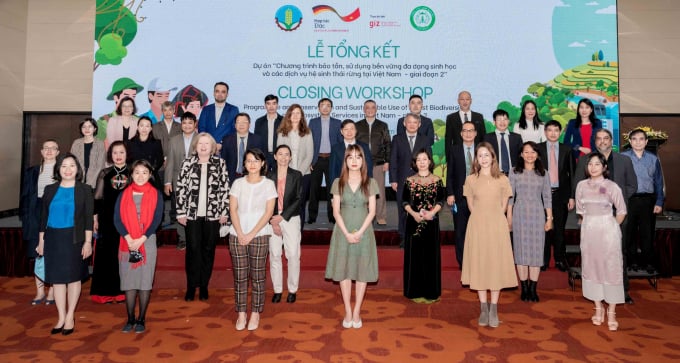June 21, 2025 | 02:47 GMT +7
June 21, 2025 | 02:47 GMT +7
Hotline: 0913.378.918
June 21, 2025 | 02:47 GMT +7
Hotline: 0913.378.918

Attendees are pictured at the closing workshop of the project of conservation and sustainable use of biodiversity and ecosystem services of forests in Vietnam. Photo: GIZ.
A workshop to review the project of conservation and sustainable use of biodiversity and ecosystem services of forests in Vietnam was held in Hanoi on December 22.
The event was jointly held by the German Development Cooperation Agency (GIZ) and the General Department of Forestry under the Ministry of Agriculture and Rural Development (MARD).
Addressing the workshop, Tran Quang Bao, Deputy Director General of the General Department of Forestry, said that Vietnam is one of the most important biodiversity hotspots globally.
Therefore, the conservation and maintenance of diverse ecosystems to ensure food security, livelihoods, and protection of people and plants from the impacts of natural disasters and climate change is a task of crucial importance, he stressed.
“After 4 years of implementation, the project has significantly contributed to achieving important goals by supporting research, building and improving the legal environment, which includes the development of forestry legislation, sub-law documents, strategies and sectoral plans with a focus on special-use and protection forests,” the Deputy Director added.
According to Project Chief Advisor, Anja Barth, the management boards of special-use and protection forests of Vietnam should learn lessons from successful approaches for sustainable management and financing for protected forests at four pilot sites: Cat Tien National Park, Bidoup-Nui Ba National Park, Than Sa- Phuong Hoang Nature Reserve, and Tram Tau Protection Forest.
Doan Hoai Nam, Project Director and Director of Special-use Forest Management Department highly appreciated its contribution to the replication and standardization of the Spatial Monitoring and Reporting Tool (SMART), an innovative management tool designed to assist protected area and wildlife managers to better monitor, evaluate and adaptively manage patrolling activities. This tool includes a software application designed to be used on the ground, by site-based staff, from community rangers to national park managers, any group, agency or individual directly engaged in, supporting, or responsible for wildlife enforcement patrols.
According to Nam, standardized data models, nationwide technical guidelines and training programs are ready to be applied in 33 special-use and protection forests currently implementing SMART in Vietnam.
Vietnam now has over 6.8 million hectares of special-use and protection forests, accounting for about 46.7% of the total forest area of the country. They play an essential role for the national economy, contribute to local livelihoods, and constitute a global biodiversity hotspot. However, Vietnam’s forests continue to be degraded and biodiversity is declining at an alarming rate. An estimated 13% of species in Viet Nam are threatened with extinction.
While Vietnam has committed to several international forest and biodiversity conservation initiatives – including the Convention on Biological Diversity – increased efforts are needed to enhance capacity, technology, and resources to preserve the rich forests and ecosystems effectively.
In this context, the project of conservation and sustainable use of biodiversity and ecosystem services of forests in Vietnam focusses on strengthening the policy framework and institutional capacity at national level, working closely with the Ministry of Agriculture and Rural Development and its subordinate agency, the Vietnam Administration of Forestry.
By increasing the engagement of local communities in forest management and planning, the project aims to strengthen natural resource governance and benefit-sharing, which allows for local communities to benefit from ecosystem services while contributing to their preservation.
This is coupled with enhancing the long-term financing of protected areas and strengthening monitoring capacity to inform decision makers. These activities contribute to a more sustainable and equitable use of ecosystem services, preserving Vietnam’s unique biodiversity for the benefit of its people and the planet.
Translated by Phuong Ha
![Turning wind and rain into action: [9] Digitizing hydrometeorological data in response to climate change](https://t.ex-cdn.com/nongnghiepmoitruong.vn/608w/files/news/2025/06/17/z6704423696987_15fd32ffc26d590d204d520c9dac6786-nongnghiep-165943.jpg)
(VAN) Farmers have begun accessing hydrometeorological applications to adjust their cropping schedules, aiming to ensure productivity and adapt to climate change.
![Turning wind and rain into action: [8] Real-time salinity detection and early warning technology](https://t.ex-cdn.com/nongnghiepmoitruong.vn/608w/files/news/2025/06/17/z6704423696987_15fd32ffc26d590d204d520c9dac6786-nongnghiep-151127.jpg)
(VAN) Thanks to the integration of modern hydrological-hydraulic models, remote sensing technologies, and artificial intelligence, the accuracy of hydrological forecasting has significantly improved.
![Turning wind and rain into action: [7] Early disaster warnings help marine farmers minimize losses](https://t.ex-cdn.com/nongnghiepmoitruong.vn/608w/files/news/2025/06/17/z6704423696987_15fd32ffc26d590d204d520c9dac6786-nongnghiep-142942.jpg)
(VAN) In recent years, thanks to early disaster warnings and forecasting, marine farmers in Khanh Hoa province have been able to reduce risks and losses, thereby improving production efficiency.
![Turning wind and rain into action: [6] ‘Four on-the-spot’ disaster management software](https://t.ex-cdn.com/nongnghiepmoitruong.vn/608w/files/news/2025/06/17/e5a48259d6a262fc3bb3-nongnghiep-183800.jpg)
(VAN) By simply activating the scenario on the disaster management software, the relevant authorities immediately know how many households need to be evacuated, where to evacuate them to, and by what means of transportation…
![Turning wind and rain into action: [5] Hue applies modern technology in disaster forecasting](https://t.ex-cdn.com/nongnghiepmoitruong.vn/608w/files/news/2025/06/17/z6704423696987_15fd32ffc26d590d204d520c9dac6786-nongnghiep-093938.jpg)
(VAN) In Hue city, modern technology has recently been applied in meteorological and hydrological forecasting and warning, helping to reduce the damage caused by natural disasters.

(VAN) A cutting-edge farming technique being implemented on an experimental ranch in Arizona's Sonoran Desert has already saved a billion gallons of water over five years, according to Civil Eats.

(VAN) Poultry and pig production and the environment can be boosted through enhanced water technology, according to new research.